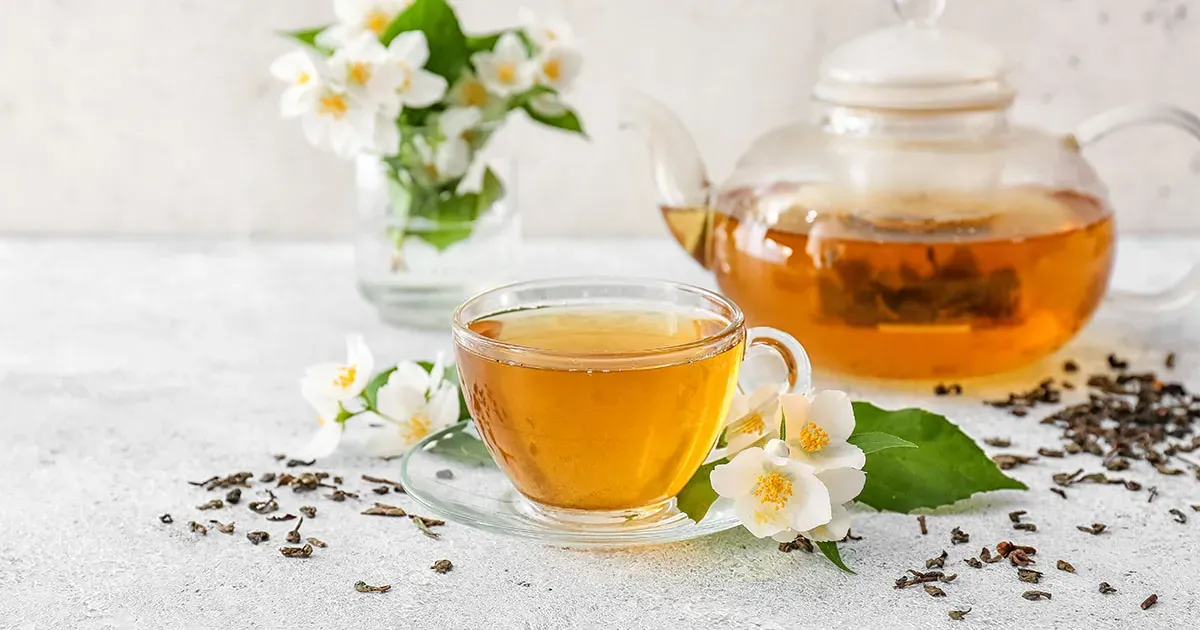All You Need to Know About Jasmine Tea

Jasmine tea is one of those timeless drinks that seems to bring a sense of calm with every sip. Whether you’re a seasoned tea lover or new to the world of infusions, jasmine tea has something special to offer.
I’ve personally explored its flavors in depth, and I have to say, there’s a reason this tea has captured the hearts (and taste buds) of people for centuries.
Let’s dive into everything you need to know about this fragrant, soothing tea, from its origins to its health benefits, and even some brewing tips for the best cup.
What Exactly Is Jasmine Tea?

At its core, jasmine tea is a blend of traditional green tea infused with the delicate scent and flavor of jasmine flowers. Sometimes, you’ll find it paired with white or black tea as the base, but green tea is the most common.
What makes jasmine tea so captivating is the way the flowers are harvested—usually at dusk, when the blooms are most fragrant—and layered over tea leaves, which absorb the floral aroma overnight.
The resulting tea has a subtly sweet, slightly perfumed taste. It's not overpowering, which makes it ideal for those who enjoy a more refined flavor without the bitterness that some green teas can have.
Every cup feels like a small, aromatic escape from the world, especially when brewed just right.
A Brief History of Jasmine Tea
Jasmine tea dates back to the Song Dynasty in China (960–1279 AD). The Chinese were already master tea producers, but jasmine tea became a favorite among royalty due to its luxurious scent and delicate balance of floral and tea flavors.
It eventually spread beyond China to other parts of Asia and later to the West, where it gained popularity as a unique and exotic tea.
Interestingly, jasmine tea was once considered a ceremonial tea, served only to guests of honor or on special occasions. While it's now more widely available, it still carries that sense of elegance and sophistication, making it a treat to enjoy, especially during moments of relaxation.
Health Benefits of Jasmine Tea
Beyond its soothing aroma, jasmine tea has some impressive health benefits. Like many teas, jasmine tea (especially the green tea variety) is packed with antioxidants called catechins, which can help fight free radicals in the body.
These antioxidants are linked to a lower risk of heart disease, improved brain function, and even weight loss.
Drinking jasmine tea regularly may also help reduce stress and anxiety, thanks to its calming scent and mild caffeine content. The aroma itself has been studied for its potential to ease stress levels and promote a sense of well-being. So, the next time you’re feeling overwhelmed, a cup of jasmine tea might just do the trick.
Additionally, jasmine tea can help improve digestion, boost the immune system, and even support healthy skin. The anti-inflammatory properties in the tea can be particularly helpful for those with sensitive skin, providing a gentle, internal remedy.
How to Brew Jasmine Tea Like a Pro
Brewing jasmine tea might seem straightforward, but there's an art to getting the perfect cup. I’ve learned through trial and error that patience and attention to detail are key.
- Water Temperature: Jasmine tea is best brewed with water that’s not too hot—around 175°F (80°C). If the water is too hot, it can burn the delicate tea leaves, resulting in a bitter flavor.
- Steep Time: Don’t over-steep! Two to three minutes is usually all you need to extract the flavors without making the tea too strong or astringent. Any longer, and you might lose that subtle sweetness that makes jasmine tea so enjoyable.
- Loose Leaf vs. Tea Bags: I’m a big advocate for loose-leaf jasmine tea because it offers a fresher, more vibrant flavor. Tea bags are convenient, but they often contain lower-quality tea. If you can, opt for loose leaf—it’s worth the extra effort!
When to Enjoy Jasmine Tea
While jasmine tea can be enjoyed any time of the day, I find it’s perfect for unwinding in the evening.
Its lower caffeine content (compared to black tea) makes it a great choice when you’re looking for a gentle pick-me-up without risking sleeplessness. It’s also ideal for pairing with light, fragrant foods like pastries, fruit, or even sushi.
Types of Jasmine Tea to Explore
As I mentioned, jasmine tea is usually made with a green tea base, but don’t be afraid to explore other varieties.
Jasmine white tea is lighter and even more delicate, offering a subtle sweetness, while jasmine black tea gives you a bolder, more robust flavor. There’s something for everyone, whether you prefer a floral whisper or a fragrant punch.
The Bottom Line
Jasmine tea is more than just a drink—it’s an experience. Whether you're drawn to it for its soothing aroma, impressive health benefits, or rich history, there's no denying its charm.
Once you've tried it, especially with loose leaves and proper brewing techniques, you'll likely find it becomes a regular part of your tea rotation.
So, go ahead and pour yourself a cup of jasmine tea. Take a moment to breathe in its fragrant scent and savor the peaceful, calming essence it brings. You deserve it.
